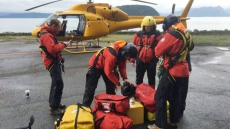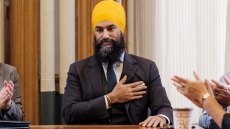VICTORIA — Two new studies say the federal and provincial governments must do more to reduce alcohol consumption after determining damages from drinking have surpassed tobacco use.
As part of the Canadian Alcohol Policy Evaluation project, researchers graded the federal, provincial and territorial governments on policy efforts to reduce alcohol-related harms.
Tim Stockwell, director with the University of Victoria's Canadian Institute for Substance Use Research, said the federal government earned a 38 per cent grade while the provinces and territories collectively achieved 44 per cent.
Ontario scored the highest grade with a C, although Stockwell said it has "gone backwards" after Premier Doug Ford moved to lower the price of alcohol with his "buck-a-beer" legislation.
"We're used to people being disinterested in these policies but what's unusual with Ontario is that they're deliberately, and publicly, and with glee, and relish going in an opposite direction that will create more problems," he said.
"I guess that's populism for you, isn't it."
About 80 per cent of Canadians drink, and most enjoy a drink or two, so making alcohol cheaper is a nice, quick, popular thing to do, he said.
But people forget there's a bill at the end of making alcohol cheap and readily available, Stockwell said, noting that some of the tragic consequences include death, economic costs, and more people with cancers and liver diseases.
"But that happens quietly in the background and claiming success in those areas doesn't get you elected as well it does giving people cheap beer," he said.
Norman Geisbrecht, a senior scientist at the Toronto-based Centre for Addiction and Mental Health, said while the impact of alcohol is more noticeable in accidents, behaviour and certain chronic diseases, there may also be an indirect impact on people's mental health.
Heavy drinking practices will have an impact on the workforce, absenteeism and affect performance at work because people may come in when they are hung over or semi-intoxicated, Geisbrecht said.
"If you make alcohol more widely available it becomes a challenge with regard to people who are maybe addicted or maybe in recovery," he said.
"Or it becomes more difficult for them to retain their abstinence or control their drinking if alcohol is more widely available or if its cheaper and if found at many different outlets."
Stockwell said researchers looked at 11 different types of alcohol policy including availability, pricing and taxation, and health and safety messaging and then developed best practices based on extensive international research.
"There's excellent practices in many areas and by most jurisdictions but they are very, very thinly spread," he said.
Manitoba has a "wonderful" minimum pricing strategy, he said, adding that British Columbia and some other provinces have "fantastic" laws to deter impaired driving.
"And they're being very effective but across the whole board every province falls down significantly in some areas even though they perform quite well in others."
Provinces that scored the lowest were New Brunswick, Prince Edward Island, Newfoundland and Labrador, Nunavut and the Yukon.
Recommendations from the researchers include introducing a comprehensive minimum price of $1.75 per standard drink for liquor store sales and $3.50 per standard drink for bars and restaurants, and independent monitoring of alcohol promotions, including both social and other media.
Tobacco comes with graphic warning images of "people dying in hospital beds," black teeth and diseased lungs, while there's a "whole slew of warning messages" about pregnancy, schizophrenia and impaired driving on cannabis packages, Stockwell said.
"With alcohol we get lovely images of rolling vineyards or images of people looking intoxicated, strange names of drinks that encourage intoxication — so the opposite of health information," he said. "There's an absence of health information."
While a lot of people would not be opposed to a few tough restrictions on these policies, most politicians hesitate to implement them, he said.
"For the same reason that Doug Ford was able to get elected promising a buck-a-beer. Because we do like our alcohol and we do tend to frown on people who point out that there are problems."

